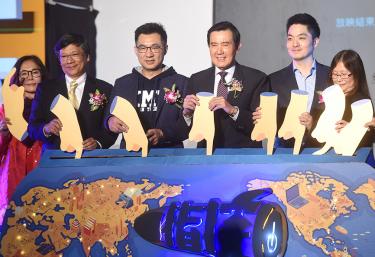Control Yuan member Chen Shih-meng (陳師孟) yesterday launched an investigation of former president Ma Ying-jeou (馬英九) for alleged abuse of power and interference in the judiciary over his administration’s probe of a prosecutor who indicted Ma on corruption charges when he was Taipei mayor.
The Control Yuan said in a statement that Chen intends to determine whether Ma went beyond his constitutional authority and interfered in the judiciary when he took action against High Prosecutors’ Office Prosecutor Hou Kuan-jen (侯寬仁) after being sworn in as president in 2008.
Chen also plans to investigate whether then-minister of justice Wang Ching-feng (王清峰) was biased against Hou and whether office prosecutors responsible for an internal probe into Hou’s handling of Ma’s corruption case were influenced by the executive branch, the statement said.
Chen said he plans to interview Hou, Ma and Wang.
The Control Yuan was referring to Hou’s indictment of Ma in February 2007 over an alleged misappropriation of NT$11 million (US$376,313 at the current exchange rate) from Ma’s special allowance during his eight-year tenure as Taipei mayor.
Hou had appealed two lower courts’ not-guilty verdicts, until the Supreme Court made the ruling final in April 2008.
In January 2008, Ma filed a lawsuit against Hou, accusing him of malfeasance for fraudulently misrepresenting Ma’s witness statements. Hou was found not guilty.
In January 2010, Ma’s lawyer, C.V. Chen (陳長文) wrote an op-ed calling on the Ministry of Justice to seek compensation from Hou for what he called negligence in the handling of a 1997 fraud case.
Ma later reportedly instructed Wang to read the article and “clarify the matter.”
A month later, Wang asked the office to look into Hou’s handling of Ma’s witness statements.
When the office cleared Hou of any wrongdoing, Wang pressed the issue until the prosecutor was reprimanded.
Former deputy minister of justice Lee Chin-yung (李進勇) also made similar accusations against Ma in 2013.
Ma’s office yesterday said that C.V. Chen’s op-ed listed a number of suggestions for the judiciary, citing as an example a Control Yuan probe that found Hou guilty of several irregularities when handling the fraud case, which had been closed by the time the article was published.
“During his time as president, Ma often referred criticism and suggestions from various sectors of society to his Cabinet members, in the hopes that they could listen to public opinion and factor it into their policymaking process,” Ma’s office spokeswoman Hsu Chiao-hsin (徐巧芯) said.
Hsu said that if Chen Shih-meng equated listening to public opinion with interference in an individual judicial case, or launched the investigation into Ma only for the sake of doing so, his actions were bound to meet with public criticism.
Additional reporting by CNA
Source: Taipei Times - 2018/03/17





















